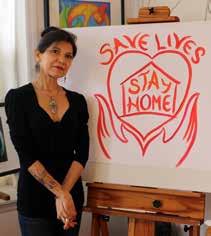
12 minute read
Community
Multisystem inflammatory syndrome in children (MIS-C) is a new health condition associated with COVID-19.
Advertisement
SEEK CARE IF YOUR CHILD HAS PERSISTENT FEVER PLUS ANY OF THESE SYMPTOMS:
Irritability or decreased activity Abdominal pain, diarrhea, or vomiting Conjunctivitis, or red or pink eyes Red, cracked lips or bumpy tongue Swollen hands or feet Lack of appetite Rash
IF YOUR CHILD IS SEVERELY ILL, GO TO AN EMERGENCY ROOM OR CALL 911 IMMEDIATELY.
For more information, call 311 or visit nyc.gov/coronavirus.
Bill de Blasio Mayor Oxiris Barbot, MD Commissioner
New NYC Department of Small Business Services Commissioner - Jonnel Doris
Jonnel Doris was appointed by May or de Blasio as the Commissioner for the NYC Department of Small Business Services (SBS). He is responsible for running a dynamic City agency focused on equity of opportunity, that leads to econom ic self-sufficiency and mobility for New York City’s diverse commu nities. SBS actively connects New Yorkers to good jobs, creates stronger businesses, and builds a thriving econ omy in neighborhoods across the five boroughs.
Formerly, Doris served as the City’s first Senior Advisor and Di rector of the Mayor’s Office for Minority and Women-owned Business Enterprises (M/WBE). Under Doris’ leadership, the City has more than doubled its certifications to 9,620 firms, tripled its utilization, and awarded more than $14.6 billion to M/WBEs. Doris also led the City’s efforts to secure a $41 million in vestment from four city depository banks: Amal gamated, Bank of America, TD Bank, and Union Bank for low interest re volving loan funds. His engagement in business communities, city agen cies, and both state and city legislatures has also influenced City efforts to pass critical state legisla tion that expands opportunities for M/WBEs.
Doris previous ly served as the first Chief Diversity Officer for the Governor’s Of fice of Storm Recovery (GOSR), which over sees New York State’s $4.4 billion recovery allocation for the U.S. Department of Housing and Urban Development (HUD), Superstorm Sandy, Hurricane Irene, and Tropical Storm Lee. At GOSR, Doris devel oped and implemented strategic initiatives re sulting in increased utilization of state and federal M/WBEs and Section 3 businesses. He created the Office of Diversity and Civil Rights, and de veloped GOSR’s award winning Local Work force Opportunities Program and Web Portal. These two resources continue to increase em ployment and business opportunities, while en abling thousands of M/ WBEs, small business es, and residents to participate in New York’s rebuilding efforts.
His professional ca reer includes extensive experience in the energy, utility, government, and business sectors work ing at Public Service Enterprise Group-Long Island, Long Island Power Authority, KeySpan and in both State and City Government. He is also a former small business owner who understands firsthand the challenges M/WBEs face.
Doris has received numerous awards and recognition over his pro fessional career. Some include, the Women Builders Council Diver sity Champion Award; NYSAMC Public Sec tor Partner Award; City and State 40 Under 40 Award; National Mi nority Business Council Award; and the His panic Chamber MWBE Advocate Award. Doris has guest lectured at Co lumbia University, New York University, Medgar Evers College, City Col lege, and frequently at Adelphi University, and Oral Roberts University School of Theology and Missions. He also serves on the Bishop’s Racial Justice and Reconcilia tion Commission for the Episcopal Diocese of Long Island.
Doris holds several degrees and certificates including, a Master of Arts in Public Policy and Analysis, a Bach elor of Arts in Political Science and Sociology from Stony Brook Uni versity, a Master of Divinity from Oral Roberts University, and a Turner School of Construction Management Certificate. He currently resides in Queens with his wife Aisha Doris and two children.
New York Forward Loan Fund N ew York Forward Loan Fund (NYFLF) is a new economic recovery loan program aimed at supporting New York State small businesses, nonprofits and small landlords as they reopen after the COVID-19 outbreak and NYS on PAUSE.
NYFLF targets the state’s small businesses with 20 or fewer full-time equivalent (FTE) employees (90% of all businesses), nonprofits and small landlords that have seen a loss of rental income.
NYFLF is providing working capital loans so that small businesses, nonprofits and small landlords have access to credit as they reopen. These loans are available to small businesses, nonprofits, and small landlords that did not receive a loan from either the U.S. Small Business Administration (SBA) Paycheck Protection Program (PPP) or SBA Economic Injury Disaster Loans (EIDL) for COVID-19 in 2020. The loans are not forgivable in part or whole. The loans will need to be paid back over a 5-year term with interest.
The working capital loans are timed to support businesses and organizations as they proceed to reopen and have upfront expenses to comply with guidelines (e.g., inventory, marketing, refitting for new social distancing guidelines) under the New York Forward Plan.
The geographic proportionality goals for the New York Forward Loan Fund for small businesses are: • Capital Region 4% • Central NY Region 4% • Finger Lakes Region 4% • Hudson Valley Region 12% • Long Island Region 18% • Mohawk Valley Region 4% • NYC Region 30% • North Country Region 4% • Southern Tier Region 4% • Western NY Region 8%
Access to loans for small landlords will be targeted to owners with residential buildings of 50 units or less, and will prioritize loans for landlords whose properties are in low and moderate income census tracts or who serve low to moderate income tenants.
The New York Forward Loan Fund is supported by Apple Bank, BNB Bank, BlackRock Charitable Fund, Citi Foundation, Evans Bank, Ford Foundation, M&T Bank, Morgan Stanley, Ralph C. Wilson, Jr. Foundation andWells Fargo.
Pre-applications for the New York Forward Loan Fund will be open on May 26, 2020 at Noon Eastern Daylight Time. Priority will be given to industries and regions that have been reopened. This is not a first-come, first-served loan program. Applications will be reviewed on a rolling basis as regions and industries reopen. For small businesses and nonprofits that are in industries and regions that have not yet reopened, you are encouraged to prepare your pre-application in advance by taking advantage of the application preparation resources available here. This will allow you to quickly submit your pre-application once it is announced that your industry and region is phased to reopen.
Five Community Development Financial Institutions (CDFIs) will be processing pre-applications on June 1, 2020: Accion East, Community Preservation Corporation, National Development Council, Pursuit and TruFund Financial Services. Please do not apply to the participating CDFI lender directly.
HEALTH-5/28 FROM THE DESK OF ASSEMBLYMAN WALTER T. MOSLEY
As the season transitions and the warm weather comes around like a dear old family friend, we know that unlike in days past, this transition and how we embrace it is unlike any other. In a recent report I was handed in a briefing of New York City and our dear beloved Brooklyn, it was revealed that our own borough is now the epicenter for not just the city or state, but for our nation. As of this past week Brooklyn has been declared the deadliest county in the nation for Covid-19.
Covid-19 and Brooklyn
As of last week Brooklyn is now outpacing Queens in terms of total deaths related to Covid-19. In fact, according to the Department of Health nearly a quarter of all confirmed Covid-19 related deaths in the entire State can be traced back to Kings County. The 3,639 deaths represent about 7 percent of the nationwide toll. Although, according to Johns Hopkins University’s Coronavirus Resource Center, the virus still ranks Brooklyn behind Queens County in terms of the hardest of any county in the country hit with the total number of infections and deaths.
I stress this point as it relates to our borough because we have to remain vigilant and disciplined when it comes to our safety and well being during this pandemic and economic shutdown. We have to continue to wear our masks, remain socially and physically distant from one another when out in public, and do all this in an effort to keep our hospital visits down while diminishing the stress to our frontline personnel, first responders, and essential workers. If we can keep this up and not give into the temptation of the warm weather, we will all benefit going forward.
New York State Budget and the HEROES Act
From last week when the U.S. House of Representatives presented and passed the Health and Economic Recovery Omnibus Emergency Solutions Act (HEROES) – an 1,800 page bill with an estimated total cost of $3 Trillion – we in the state legislature knew we had to acknowledge that a very important step had been taken by Congress. This bill still -- by many economist and their economic forecasts -- falls short of what many believe by an estimated $2 trillion. With that being said, I do applaud my colleagues in the House of Representatives for this necessary funding package geared for the states, their municipalities and localities. Of the $3 Trillion allocated in this bill, the following aid was highlighted: $500B in direct aid to the states. $375B to local governments. $20B to tribal governments. $20B to U.S. Territories.
HEROES Act – Renters and Homeowners Protections
In an effort to protect renters from evictions and individual homeowners from foreclosures. $100B in emergency assistance to low income renters to avoid evictions. For homeowners who may need direct assistance with their mortgage payments and other housing costs an additional $75B was earmarked.
HEROES Act – Election Security
The act includes a $3.6B in grants for states planning and preparing for elections and bolstering election security.
HEROES Act - Hazard Pay
In addition to aids to states and localities, $200B was designated to ensure hazard pay to essential workers. Their employers would be able to apply for grants to provide per hour premium pay to essential workers. Employers would be eligible for grants of $10K per worker or $5K for highly compensated essential workers. In addition, $850M would be allocated for states to provide child and family care for essential workers.
HEROES Act – Unemployment Benefits and Student Loan Forgiveness
The act provides an extension of $600 per week boost in unemployment insurance established under the bill until January 2021 to assist millions who have lost their jobs during the pandemic. Likewise, the legislation would extend existing loan payment plans established in the act, which did not cover private loan borrowers in the past. The forgiveness of student loan debt would provide up to $10K in relief to be applied to a private student loan – to be paid in monthly installments by the Treasury Department until September 2021.
HEROES Act – Funding for Testing, Training and Treatments & Farmers Assistance
From the act $75B was designated for Covid-19 testing, contact training and isolation measures. The legislation would also ensure all Americans receive free Covid-19 treatment. In addition, $50M would assist farmers, farmers markets and local food outlets affected by market disruptions. Likewise, $50B would be allocated to beginning farmers and ranchers; another $16.5M would go in direct payments to agricultural producers.
The HEROES Act is a robust first step towards making our state and nation as whole as possible. With New York designated to receive from this bill a total of $44B ($21B in FY 2020 & $23B in FY 2021), we understand that the U.S. Senate will demand a robust negotiation with House leadership. And depending on what we get in a final negotiated bill will determine how we will address our growing state budget deficit. A deficit that started out at $6B and now exceeds $16B. Whether we are talking about housing/healthcare, transportation infrastructure, or education cuts – any talks of amending our state budget will not be addressed absent revenue. The entire state depends on all of us doing our part from a fiscal perspective – and that includes generating new revenue streams.
The impact of revising our state budget won’t be solely on the proverbial backs of essential workers, first responders, or frontline workers and their families. To avoid drastic cuts to our state budget, the need to bring along all wage earners to the table to determine what they will contribute is an absolute necessity if we are going to get through this pandemic together.
Congratulations Scholars
Last, I want to congratulate all of our college and university graduates. Although this graduation was not an ideal end to your collegiate career, this does not take away from the actual accomplishment of graduating. Whether from undergraduate, graduate or professional school – I am extremely proud of all of you and look forward to changing the world with you as we seek to get through this pandemic. To your families and friends – thank you for all you have done on behalf of our graduates and we know without you none of
Bronx Borough President & BOEDC Disburse COVID-19 Emergency Funds to Local Small Businesses O n Thursday, May 21, 2020, the office of Bronx Borough President Ruben Diaz Jr. and The Bronx Overall Economic Development Corporation (BOEDC) announced that the first set of loans were approved and released by the Board of Directors.
Four Bronx businesses received loans this week that will support their operations during the COVID-19 pandemic. A total amount of $320,000 from the $1 million fund has been released to support local businesses.
“We must do all that we can to give our borough’s small businesses a chance to survive in these difficult times,” said Bronx Borough President Ruben Diaz Jr. “Our Bronx small businesses and entrepreneurs, who have been forced to adapt due to the changing landscape created by the COVID-19 pandemic, are a key component of our economy, and protecting vulnerable local job-creators is important as we look to rebound from this crisis.”
The Bronx Business Continuity Loan Fund is open to small businesses seeking loans, ranging from $10,000 to $100,000, to help keep them afloat during their time of most economic need. The loans are for a five-year term with a one percent interest charge in order to help the businesses rebuild as well as rehire local workers.
“I am proud to point out that of the four loans disbursed, three are MBE or WMBE businesses, thereby reflecting the diversity of the owners as well as the type of businesses”, said Marlene Cintron, President of the Bronx Overall Economic Development Corporation. “Our small businesses were locked out of the PPP process by their respective banks. Others were unable to qualify. BOEDC is their window to keep their doors open. With over 60 applications still in the pipeline, my concern is running out of funds. As a result, we are looking for more financial support to supplement our fund.”
The four businesses who were funded thus far by The Bronx Business Continuity Loan Fund -- Bronx Design, Woodlawn Medical Associates, SIDCO Food Distributors, and Infinity Fitness NYC -- are all located in neighborhoods scattered throughout The Bronx, providing economic relief borough-wide.
Businesses interested in receiving an application can email their request to mcintron@boedc.org.









